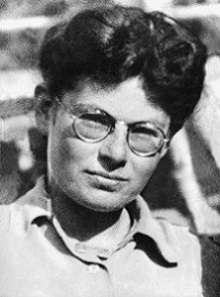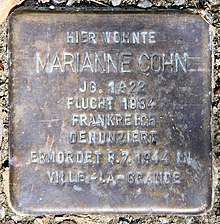Marianne Cohn
Marianne Cohn was a German-born French Resistance fighter. She was born on 17 September 1922 in Mannheim and died on 8 July 1944 in Haute-Savoie.


Biography
Marianne Cohn was the eldest child of a family of German intellectuals of Jewish descent, but they did not practice Judaism and had little connection to the Jewish community of Germany. The family left Germany, eventually settling in France where Marianne's parents were deported to the Gurs internment camp, as German nationals. She and her sister were taken in by the Jewish Scouts organization, with the opportunity to rediscover their Jewish identity.[1]
In 1942 Marianne began to smuggle Jewish children out of France. Threatened with deportation, she was incarcerated at Nice and released three months later. It was during this initial detention in 1943, she wrote her famous poem "Je trahirai demain" (I shall betray tomorrow):
Tomorrow, I will betray, not today.
Tear out my nails today,
I will not betray.
You don't know how long I can hold out
but I know.
You are five rough hands, with rings.
You have hob-nailed boots on your feet....
Today I have nothing to say.
Tomorrow, I will betray. (...)[2]
After her release she resumed her underground activities, supervising children before their departure for Switzerland. Later, in January 1944, she began working with Rolande Birgy (see French Wikipedia article), shuttling two or three groups, each with up to twenty children across the southern border, passing through Lyon and Annecy. Birgy had been teamed with Mila Racine (see French Wikipedia article) before she was arrested on 21 October 1943.[3]
Cohn was arrested on 31 May 1944 near Annemasse with a group of twenty-eight children, and incarcerated at the Hotel Pax by the Gestapo. Despite the torture, she did not speak. Her resistance unit formed a plan to free her, but she refused, fearing reprisals on children.[4] On the night of 8 July 1944 the Gestapo of Lyon sent a team to Annemasse to remove six prisoners, including Cohn, and killed them in a forest near Ville-la-Grand by hitting them with clubs or rifle butts.[5][6]
Commemoration
On 7 November 1945, the French military government awarded Marianne Cohn posthumously with the war cross with silver star. There is a school in Annemasse, a school in Berlin and a street in Ville-la-Grand bearing her name.[7]
References
- Schilde, Kurt (2007). "Geht die Arbeit weiter? Marianne Cohn - illegale Sozialarbeiterin in der Resistence." In: Jugendopposition 1933-1945: ausgewählte Beiträge. Lukas Verlag. pp. 63–75. ISBN 978-3-86732-009-2.
- Paldiel, Mordecai (2012). Righteous Gentiles and Courageous Jews: Acknowledging and Honoring Rescuers of Jews. French Politics, Culture & Society 30, (2), pp. 134-149
- Je voudrais évoquer ici le souvenir de quatre de mes camarades de Résistance... Mais après l'arrestation de Mila Racine et de Roland Epstein, Marianne, alors âgée de 21 ans, passe à la Sixième et prend la relève avec Rolande Birgy, militante de la JOC (Jeunesse Ouvrière Chrétienne), reconnue en 1984 comme Juste parmi les Nations.
- Mordecai Paldiel (2012). Righteous Gentiles and Courageous Jews: Acknowledging and Honoring Rescuers of Jews. French Politics, Culture & Society 30, (2), p. 146
- Dozol, Vincent (21 juin 2010). Annemasse, ville frontière 1940-1944, Université de Lyon, Institut d'Etudes Politiques de Lyon, p.33
- Meyer, Ahlrich (2017). Das Dossier Marianne Cohn. Geschichte einer gescheiterten Ermittlung. Einsicht, 17. Bulletin des Fritz-Bauer-Instituts, p. 21–25
- Schilde (2007), pp. 74-75
Bibliography
- Bruno Doucey, Si tu parles, Marianne, éd. Élytis, 2014
- Magali Ktorza, "Marianne Cohn, I betray tomorrow, not today, Revue d'histoire de la Shoah,No. 161, September–December 1997, pp. 96–112
- François Marcot, Robert Laffont (eds.), "Marianne Cohn", in: Dictionnaire historique de la Résistance, 2006, pp. 392–393
- Croquet, Jean-Claude (1996). Chemins de passage: les passages clandestins entre la Haute-Savoie et la Suisse de 1940 à 1944, [exposition itinérante réalisée à Gaillard en 1995]. Saint-Julien-Genevois: La Salevienne. pp. 71–80
External links
- Doreen Rappaport, "Beyond Courage", jwmag.org; accessed 5 December 2016
- Ludwig Fineltain, LES SYNDROMES DES SURVIVANTS DE LA SHOAH, bulletindepsychiatrie.com; accessed 5 December 2016